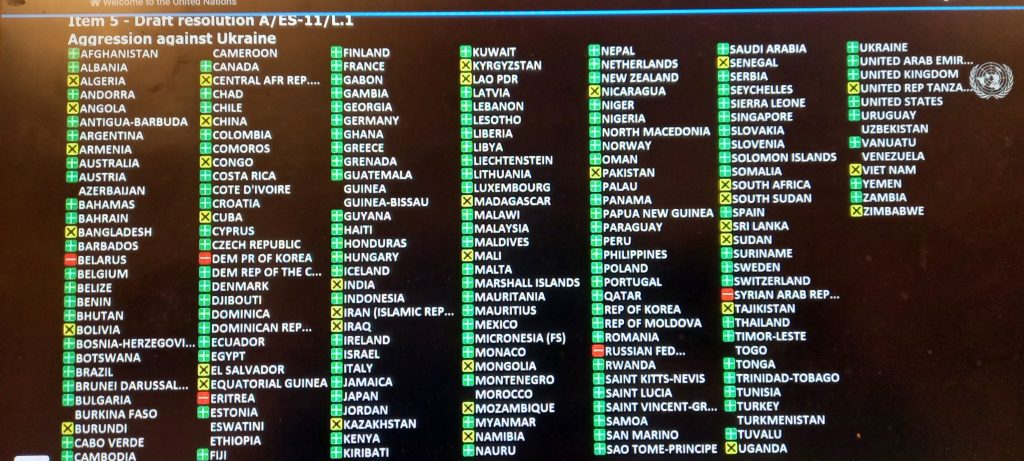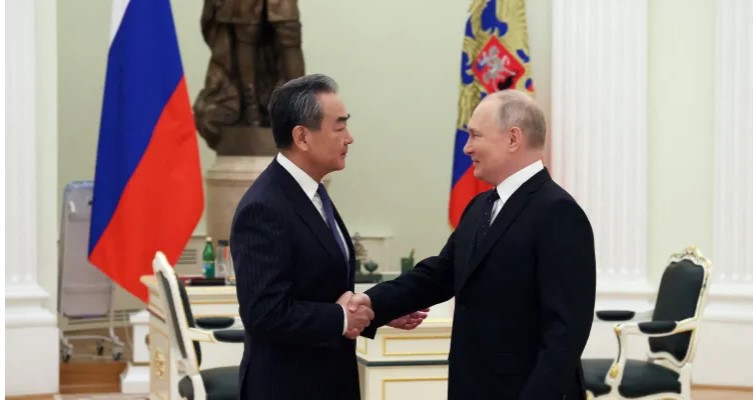India, China, Sri Lanka, and Pakistan among 32 abstentions in UN vote on Russian invasion of Ukraine
Posted on February 24th, 2023
Courtesy NewsIn.Asia
New York, February 24: India abstained in the U.N. General Assembly on February 23 on a resolution that underscored the need to reach as soon as possible a comprehensive, just and lasting peace” in Ukraine in line with the principles of the U.N. Charter.
The 193-member General Assembly adopted the draft resolution, put forward by Ukraine and its supporters, titled Principles of the Charter of the United Nations underlying a comprehensive, just and lasting peace in Ukraine.
The resolution, which got 141 votes in favour and seven against, underscores the need to reach, as soon as possible, a comprehensive, just and lasting peace in Ukraine in line with the principles of the Charter of the United Nations.” India was among the 32 countries that abstained.
For the first time, India votes against Russia in UNSC during procedural vote on Ukraine
The resolution called upon member states and international organisations to redouble support for diplomatic efforts to achieve a comprehensive, just and lasting peace in Ukraine, consistent with the Charter.
It reaffirmed its commitment to the sovereignty, independence, unity and territorial integrity of Ukraine within its internationally recognised borders, extending to its territorial waters and reiterated its demand that Russia immediately, completely and unconditionally withdraw all of its military forces from the territory of Ukraine within its internationally recognised borders, and calls for a cessation of hostilities.
In the year since Russia’s February 24, 2022 invasion of Ukraine, several U.N. resolutions — in the General Assembly, Security Council and Human Rights Council, have condemned the invasion and underlined the commitment to the sovereignty, independence, unity and territorial integrity of Ukraine.
India has abstained on the U.N. resolutions on Ukraine and consistently underlined the need to respect the U.N. Charter, international law and the sovereignty and territorial integrity of states.
New Delhi has also urged that all efforts be made for an immediate cessation of hostilities and an urgent return to the path of dialogue and diplomacy.
In September 2022, External Affairs Minister S. Jaishankar said in his address to the high-level U.N. General Assembly session that in this conflict, India is on the side of peace and dialogue and diplomacy.

As the Ukraine conflict continues to rage, we are often asked whose side are we on. And our answer, each time, is straight and honest. India is on the side of peace and will remain firmly there. We are on the side that respects the UN Charter and its founding principles. We are on the side that calls for dialogue and diplomacy as the only way out,” Jaishankar had said, adding that it is in the collective interest to work constructively, both within the United Nations and outside, in finding an early resolution to this conflict.
India has also consistently underlined that in the conflict, the entire global South has suffered substantial collateral damage” and developing countries are facing the brunt of the conflict’s consequences on food, fuel and fertiliser supplies.
Jaishankar had said that India is on the side of those that are struggling to make ends meet, even as they stare at the escalating costs of food, of fuel and fertilisers.” The UNGA resolution called for an immediate cessation of the attacks on the critical infrastructure of Ukraine and any deliberate attacks on civilian objects, including those that are residences, schools and hospitals.
It urged all member states to cooperate in the spirit of solidarity to address the global impacts of the war on food security, energy, finance, the environment and nuclear security and safety and underscored that arrangements for a comprehensive, just and lasting peace in Ukraine should take into account these factors.
China
China has called for a ceasefire between Ukraine and Russia and a gradual de-escalation of the situation that will pave the way for peace talks, as part of a 12-point proposal to end the conflict.
The plan by China, which was released on Friday morning by the foreign ministry and coincides with the first anniversary of Russia’s invasion of Ukraine, urges an end to Western sanctions against Russia, the establishment of humanitarian corridors for the evacuation of civilians, and steps to ensure the export of grain after disruptions caused global food prices to spike last year.
Conflict and war benefit no one,” the ministry said in a statement.
All parties must stay rational and exercise restraint, avoid fanning the flames and aggravating tensions, and prevent the crisis from deteriorating further or even spiralling out of control,” it said.
All parties should support Russia and Ukraine in working in the same direction and resuming direct dialogue as quickly as possible, so as to gradually deescalate the situation and ultimately reach a comprehensive ceasefire.”
The proposal mainly elaborates on long-held Chinese positions, including that all countries’ sovereignty, independence and territorial integrity be effectively guaranteed”. The plan also called for an end to the Cold War mentality”, which is Beijing’s standard term for what it regards as global dominance by the United States and its interference in other countries’ affairs.

Beijing — which claims to be neutral in the conflict — has a no limits” relationship with Russia and has refused to criticise Moscow’s invasion of Ukraine or even refer to it as such. It has also accused the West of provoking the conflict and fanning the flames” by providing Ukraine with arms.
Beijing’s top diplomat Wang Yi visited Moscow this week and pledged a deeper relationship between the countries, while Putin hailed new frontiers” in ties with Beijing and signalled that China’s leader Xi Jinping would visit Russia.
Xi is expected to deliver a peace speech” on Friday, though some analysts have cast doubt on whether Beijing’s efforts to act as a peacemaker will go beyond rhetoric.
The ambassador of the European Union to China, Jorge Toledo, told reporters at a briefing in Beijing on Friday that China had released a position paper not a peace proposal, and the EU will study it.
Ukraine called the position paper” a good sign” and said it expects China to be more active in its support of Ukraine.
We hope they also urge Russia to stop the war and withdraw its troops,” Ukraine’s charge d’affaires Zhanna Leshchynska said at the same briefing.
US State Department spokesman Ned Price had said earlier on Thursday that Washington would reserve judgement on the proposal but that China’s allegiance with Russia meant it was not a neutral mediator.
We would like to see nothing more than a just and durable peace … but we are sceptical that reports of a proposal like this will be a constructive path forward,” he said.
On Thursday, China abstained from voting when the United Nations General Assembly (UNGA) approved a nonbinding resolution that called for Russia to end hostilities in Ukraine and withdraw its forces.
The UNGA overwhelmingly adopted the resolution that demanded Moscow withdraw from Ukraine and stop fighting.
There were 141 votes in favour of the resolution and 32 abstentions. Six countries joined Russia to vote against the resolution: Belarus, North Korea, Eritrea, Mali, Nicaragua and Syria.
Russia’s Deputy UN Ambassador Dmitry Polyanskiy dismissed the UN resolution as useless”.
Ukrainian President Volodymyr Zelenskyy wrote on Twitter that the UN vote was a powerful sign of the unflagging global support” for Ukraine.
U.N. Secretary-General Antonio Guterres told the emergency special session of the General Assembly that resumed on February 22 that Russia’s invasion of Ukraine is an affront to our collective conscience” and said it is high time” to step back from the brink.
The one-year mark of Russia’s invasion of Ukraine stands as a grim milestone — for the people of Ukraine and for the international community. That invasion is an affront to our collective conscience. It is a violation of the United Nations Charter and international law,” Mr. Guterres said adding that the invasion is having dramatic humanitarian and human rights consequences.
In a strong message, Mr. Guterres said the war is fanning regional instability and fuelling global tensions and divisions while diverting attention and resources from other crises and pressing global issues. Meanwhile, we have heard implicit threats to use nuclear weapons. The so-called tactical use of nuclear weapons is utterly unacceptable. It is high time to step back from the brink,” he said.